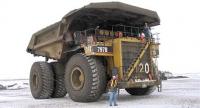A survey released today by the Alberta-based Pembina Institute and the World Wildlife Fund finds that companies involved in the development of the Alberta tar sands are seriously lacking when it comes to protecting our environment.
Tar sand companies were invited to respond to a survey based on 20 different environmental indicators in five categories: environmental management, land impacts, air pollution, water use and management of greenhouse gases.
The results are embarrassing and Canadians should be outraged that so much profit is being made with so little concern for the impact it’s having on our environment.
“There is growing concern in Alberta, in the rest of Canada and internationally about the environmental impacts of oil sands mining,” said Simon Dyer of the Pembina Institiute. “Despite these concerns we found that oil sands companies are making weak efforts to manage their environmental impacts.”
Key findings in the report include:
- With the exception of a single tar sands mining operation, no operation has voluntary targets to limit absolute greenhouse gas emissions.
(Factoid: the Alberta tar sands represent the largest single point source of greenhouse gas emissions in Canada).
- No project or company has publicly reported their efforts to reduce the amount of fresh water used in tar sand extraction and processing.
(Factoid: the Alberta tar sands use more fresh water in a year than the entire city of Calgary – population 1 million).
- Despite 40 years of tar sands development, not a single hectare of land has been certified as reclaimed to its natural state.
(Factoid: the tar sands projects could eventually span 149,000 square kilometers of Alberta’s boreal forest – about the same size as the State of Florida)
You can click here to download a pdf version of the fact-sheet or you can click here for a pdf version of the entire report.
If you like this story, please consider voting for it on Digg.com by clicking here.
Subscribe to our newsletter
Stay up to date with DeSmog news and alerts






